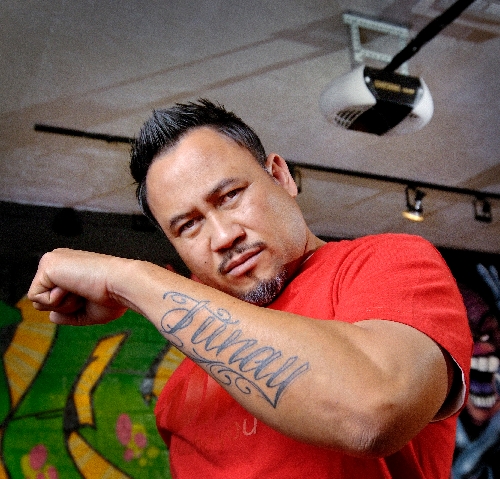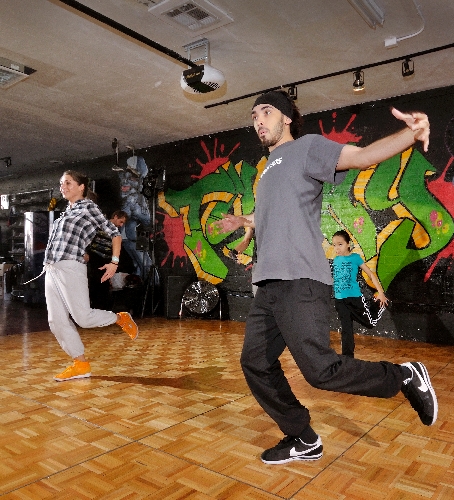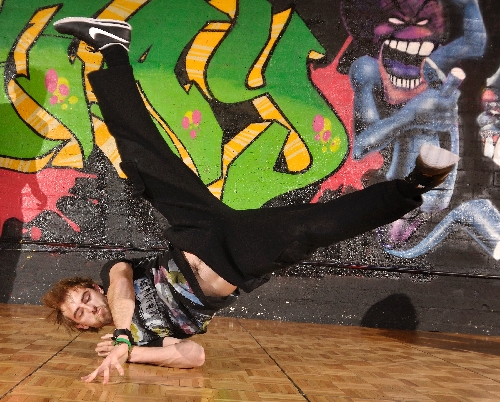Ex-gang member’s dance studio keeps kids off street
On his classic song "Juicy" the late Notorious B.I.G. rapped, "You never thought that hip-hop would take it this far." More than 15 years later, Las Vegan Jojo Peralta knows exactly what he meant.
Peralta discovered hip-hop in '82 at age 13. He still remembers where he was when he heard Afrika Bambaataa's "Planet Rock" - riding bikes with friends through his neighborhood off Nellis Boulevard and Washington Avenue. The song became an anthem for b-boys, kids with a gift for break dancing. Peralta didn't know it at the time, but he would soon become one.
Today he owns Tunay Street Dance & T-Shirt Printing Studio in downtown Las Vegas. Kids age 4 and older frequent the spot for professional break dancing lessons. Some have gone on to Jabbawockeez fame and to perform on "America's Best Dance Crew." And, world-famous break dancers practice and teach workshops at his studio.
If someone back in '82 told Peralta how far hip-hop and his beloved break dancing would come, he would have never believed it. More importantly, he would have never joined a gang.
Peralta is giving Las Vegas youth something he longed for as a kid but couldn't attain: a positive sense of belonging.
For a couple of years, break dancing gave him that. His first exposure to the hip-hop dance form came when he saw a band perform from Eldorado High School called Sounds of the Sun. They had 10 break dancers with them.
"When I saw that I was captivated," he recalls.
Between that and the movie "Breakin' ," the seventh-grader desperately wanted in on this b-boying thing. He started taking cardboard boxes from Home Depot trash bins and taping them to his friend's garage floor for cushioning. He and his friends six-stepped and windmilled their way to b-boy status. Discovering the hidden talent and perfecting it was exhilarating. But, what to do with it? They had no venue to showcase their moves.
Today, b-boys and b-girls hoping to take it to the next level have a buffet of options. Underground battles around town offer cash prizes from $100 to $1,000. Annual events such as Vegas Shakedown and Hip Hop International provide a larger forum. Once they've outgrown these sources, break dancers might look to "America's Got Talent" and "So You Think You Can Dance," which hold regular auditions here. Beyond that is a ticket out of Vegas. If not to Los Angeles, where dancers can secure agents for gigs in music videos, then to Europe where international invitational competitions reward winners with cash prizes ranging from $50,000 to $300,000.
That simply wasn't the case in the early '80s. Peralta's b-boy skills started in his friend's garage and ended there. He yearned for something bigger.
"At a certain age, people get like, they're not popular in school," he says. "They think, 'I'm not a cheerleader, I'm not a jock 'cause I can't afford sports, I'm not in band. So where can I fit in?' "
Peralta fit in with the Pinoy Boys, a predominantly Filipino gang identified by the color white. By the end of 10th grade, he was a bona fide gangbanger.
For more than five years Peralta says he lost friends and retaliated, lost friends and retaliated. It wasn't until his early 20s that an escape route presented itself. A younger generation of Pinoy Boys worked its way up the ranks and took over the reins. A marriage and the National Guard finally got Peralta's head straight. He backed away from the lifestyle until it was out of sight. Unfortunately, so was break dancing.
In 2010, Peralta got laid off from his job as a doorman at New York-New York, where he worked for 13 years. With money from a business buyout, he bought a screen-printing machine to make T-shirts and hats. While searching for a studio to house it, he reconnected with an old friend from Sounds of the Sun.
Through him, Peralta rediscovered an old love. He tagged along to a local b-boy battle and couldn't believe what he saw. Someone finally opened the garage door.
"I was like, 'People still b-boy?' " he says. "There were all ages there, families. It went on for hours. I couldn't believe (break dancing) was still this big. It even got bigger."
He decided then and there his screen-printing business needed a space big enough for a dance studio. He already had a name: Tunay. It means real, true and genuine in Tagalog, a language of the Philippines where Peralta lived until age 6.
If he was going to give kids a hip-hop experience, he was going to make it "tunay." Forget the watered-down version of break dancing that other studios in town were calling "hip-hop" dance. This would be the real deal, the kind of studio that earns kids the coveted titles of "b-boy" and "b-girl."
On a recent Friday afternoon, he sat back and watched as his vision played out before him. Backpacks littered the studio's entrance. A Nicki Minaj song thumped from speakers. And kids in baggy clothes memorized choreography. They came to audition for a part in the Tunay-born RTG dance crew, which is booked for four months solid with performances.
Peralta knows better than anyone that there are myriad ways the 14 kids could be spending their time now. He's thrilled they've chosen this way.
Ella Bailey, 21, said she wasted her days and partied her nights away before discovering Tunay. If it weren't for the studio where she now teaches classes, she'd be "getting into trouble."
Here she has structure.
"It gives me something to be truly passionate about," she says. "When I go home, it's what I look forward to waking up to."
She's not alone. The Tunay word has spread, but the studio hasn't. As kids learn moves on the dance floor this afternoon, a good chunk of them spill off of it. Peralta has simply outgrown his space. A nice problem to have, but still a problem.
He doesn't have the financial means to move to a larger studio. Peralta keeps fees as low as possible (newbies are free, $13 for walk-ins and membership fees start at $45 a month) so cost doesn't prevent participation. The point, after all, is to let kids be a part of something. He just wants to stay true to the Tunay name.
"People live there lives forever trying to find a passion and I think I've found mine," Peralta says. "I love what I do - dancing and doing something positive. I did so many bad things. This is one way to give back to the community."
The Tunay studio does its best to pay homage to the street scene where break dancing was born. Graffiti covers the walls. Sneakers, tied together by laces, dangle from a mock power line. And, even though there's no parking on the dance floor, an automatic garage door opener hangs from the ceiling.
Tunay Street Dance & T-Shirt Printing Studio is at 1118 S. Main St., 228-8629.
Contact feature writer Xazmin Garza at xgarza@reviewjournal.com or 702-383-0477. Follow her on Twitter @startswithanx.



















